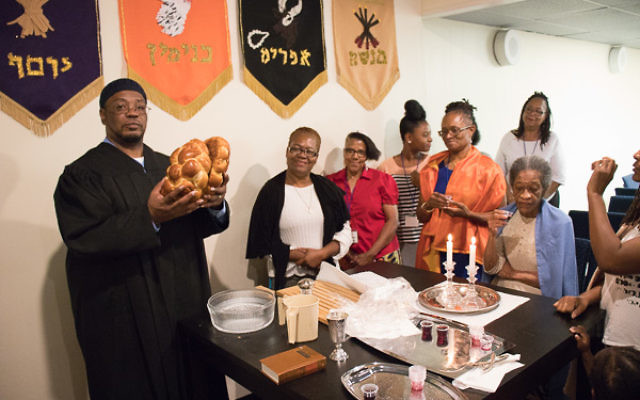Rabbi Confident of Path to College Park
A congregation affiliated with the International Israelite Board of Rabbis finds a home outside Atlanta.

The words of the Shema resonating through the small synagogue sounded like the traditional prayer Jews have chanted for centuries, but the melody, backed by a quartet of large conga drums, was straight out of the Southern black gospel tradition.
Welcome to Congregation Or-Ami (Light of My People), one of Atlanta’s newest Jewish religious communities and the first local synagogue founded by African-Americans.
The small worship space in a half-vacant office park next to the railroad tracks in College Park has all the usual furnishings: a modest ark for the Torah scroll, a simple reading table for the Torah service and a lectern for the rabbi.
The women sit on one side of the room, modestly dressed in long skirts and turbans. The men, on the opposite side, daven with prayer shawls and covered heads.
Leading the service on a typical Shabbat morning is Rabbi Shalem Yeshurun, a graduate of the Israelite Rabbinical Academy and a second-generation rabbi who grew up Jewish in the Bedford-Stuyvesant neighborhood of Brooklyn.
“A lot of Jewish people don’t agree with the drumming,” he said, “but our concept is that the Sabbath is a day of rejoicing and a day of worship.”
He added: “It’s a joyful day, and the Scriptures say make a joyful noise for Hashem.”
For 10 years after moving here from New York, he and his family made the 65-mile round trip from Riverdale in south Atlanta to Congregation B’nai Torah, a Conservative synagogue in Sandy Springs, for Shabbat worship.
“I grew stronger in my convictions when I moved to Atlanta and saw how I was accepted at B’nai Torah,” Rabbi Yeshurun said. “The color of my skin didn’t matter. As long as you believe and you have faith, you’re accepted.”
But so-called Black Jews or Hebrew Israelites, as they prefer to be called, have not always found acceptance as a religious movement in official Jewish circles.
Their founder, the self-proclaimed Rabbi Wentworth Matthew, who established the Hebrew Israelites over a century ago in New York, was twice turned down for membership in the New York Board of Rabbis.
The established branches of Judaism kept their distance. Israel doesn’t grant them automatic citizenship under the Law of Return. Over most of the past century there was little or no contact between white and black Jews.
But relationships have begun to thaw. The chief rabbi of the International Israelite Board of Rabbis is Capers Funnye, who holds bachelor’s and master’s degrees from the prestigious Spertus Institute for Jewish Learning and Leadership.
His Chicago synagogue, which is listed on the Guide to Jewish Living website of the Chicago Jewish Federation, is the largest congregation of the approximately dozen Hebrew Israelite synagogues.
And he is an accepted member of the Chicago Board of Rabbis.
Just before President Barack Obama’s first inauguration in 2008, he was the featured speaker on Martin Luther King Day at the Stephen Wise Free Synagogue in New York, the first Hebrew Israelite religious leader to be so honored by an important mainstream congregation.
It may have helped that he is Michelle Obama’s first cousin, a connection that was prominently mentioned during his visit in recent years to Israeli Prime Minister Benjamin Netanyahu.
When the International Israelite Board of Rabbis met for its annual meeting in August, the Israelites chose Atlanta. The choice was in part recognition of the importance they see in their new congregation. It was recognition as well, perhaps, of the important role Atlanta’s Jews play in the national Jewish community.
The importance of that connection hasn’t been lost on Rabbi Yeshurun in College Park.
“My goal is to bridge those spaces between the African-American community and the Jewish community as a whole,” he said. “We have a little different flavor, but, bottom line, we do the same things, we respect the same things.”
The four-hour service I attended was little different in many respects than an extended Shabbat service in most parts of America. There was a prayer book with all the important prayers in Hebrew and English. The Torah service extended aliyot for the honor of reading from the Holy Scripture. There was a discussion of Jewish dietary laws, and an emphasis was placed on understanding the moral lessons of the weekly parshah.
As the holy season of holidays approaches, Rabbi Yeshurun is as sure as he has ever been of the path that he is on.
“I know this is where I am supposed to be. When I get up every morning and put on my tallit before I go to work in the morning, it is that ruach, that spirit, that overtakes me,” he said.
“It lets me know that I couldn’t be anywhere else.”
Bob Bahr will conduct High Holiday services for Shema Yisrael — The Open Synagogue and for the Jewish residents at Huntcliff Summit, a senior living community in Sandy Springs. All evacuees from Hurricanes Irma and Harvey are welcome to attend Shema Yisrael’s services free with IDs and no tickets; see www.shemaweb.org for the schedule.



comments